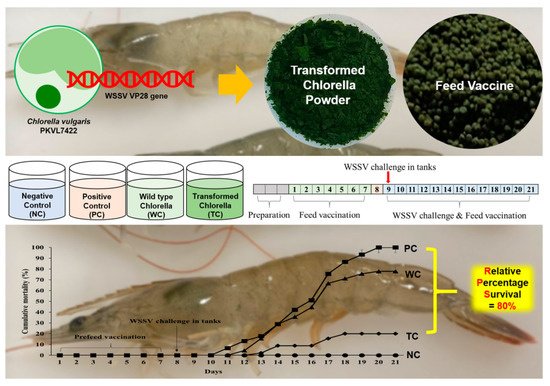
The global shrimp industry has long battled a formidable adversary: White Spot Syndrome Virus (WSSV). This viral pathogen is known for its ability to wreak havoc, causing a mortality rate of nearly 100% in infected shrimp in just a matter of days.
The economic implications of the WSSV’s impact are significant and represent a considerable threat to the global shrimp farming community. Despite its devastating effects, options for preventing and treating WSSV infections have been surprisingly limited, and to date, there have been no effective means to treat or prevent White Spot Syndrome Virus.
However, a ray of hope emerges from the world of biotechnology. Scientific research conducted by scientists from Pukyong National University, the Korea Institute of Ocean Science & Technology, and Junggyeom Co., Ltd. has revealed a promising avenue in the battle against WSSV: the use of Chlorella vulgaris, a green microalgae, to produce a recombinant WSSV protein called VP28 for use in oral shrimp vaccines. The results of this study are nothing short of groundbreaking.
The Efficacy of Chlorella vulgaris Expressing VP28
Chlorella is a genus of microalgae that exhibits rapid growth. Due to this characteristic, it only requires a supply of simple carbon sources to produce high levels of protein. This microalgae has received certification from the U.S. Food and Drug Administration to be used as a food additive for shrimp in place of fishmeal.
In a notable breakthrough, researchers explored the potential of the VP28 gene (GenBank no. AY422228.1), a recombinant protein of WSSV produced in C. vulgaris, as an oral vaccine for shrimp.
The research revealed surprising results.
Shrimp that were fed a diet containing 5% of C. vulgaris expressing VP28 exhibited a cumulative mortality rate of only 20% when exposed to WSSV. In stark contrast, the control group, which did not receive the vaccine, experienced a grim cumulative mortality rate of 100% in just 12 days of infection. These results suggest that the vaccine based on C. vulgaris expressing VP28 is a potent weapon against the deadly WSSV.
“One reason for the increased survival of L. vannamei after consuming a lower dose of transformed C. vulgaris might be its high expression of VP28, which was estimated to be 11 mg of VP28 per g (wet weight) of transformed C. vulgaris,” reported the scientists.
Boosting Shrimp Immune Responses
The magic of this vaccine lies in its ability to stimulate the shrimp’s immune system. When shrimp were vaccinated with C. vulgaris expressing VP28, a significant upregulation in the transcription of crucial genes associated with shrimp defense against WSSV infection was observed. These genes included anti-lipopolysaccharide factor, C-type lectin, and prophenoloxidase genes, which experienced positive regulation of 29.6 times, 15.4 times, and 11.5 times, respectively, compared to unvaccinated shrimp.
This enhancement of immune responses against WSSV provides a critical defense line for shrimp, potentially reducing the impact of the virus and increasing their chances of survival.
The Potential of Chlorella vulgaris as an Industrial Vaccine Host
The research findings underscore the potential of C. vulgaris as a host for the industrial production of shrimp vaccines. This versatile microalgae can be harnessed to express and produce critical proteins like VP28, offering an effective means to develop oral shrimp vaccines.
Conclusion
In conclusion, the battle against WSSV in the shrimp farming industry may have gained a formidable ally in the form of the C. vulgaris-based vaccine expressing VP28. With its ability to significantly reduce mortality rates and enhance shrimp immunity, this breakthrough has the potential to revolutionize the industry and pave the way for a brighter and more sustainable future for shrimp farming.
“When administered as an oral food additive vaccine, C. vulgaris PKVL7422 expressing VP28 showed a strong protective effect against WSSV infection. Furthermore, vaccinated shrimp expressed elevated levels of proPO, ALF, and CTL genes, which participate in shrimp defense against WSSV infection,” concluded the scientists.
As scientists continue to explore the possibilities of this innovative approach, there is renewed hope that the devastating impact of WSSV on shrimp populations can be significantly mitigated. The collaboration between biotechnology and aquaculture is opening a path to a more resilient and prosperous shrimp farming industry.
The research was funded by the Korea Institute of Marine Science & Technology Promotion (KIMST) of the Ministry of Oceans and Fisheries.
Reference (open access):
Kim, M.-J.; Kim, S.-H.; Kim, J.-O.; Lee, T.-K.; Jang, I.-K.; Choi, T.-J. Efficacy of White Spot Syndrome Virus Protein VP28-Expressing Chlorella vulgaris as an Oral Vaccine for Shrimp. Viruses 2023, 15, 2010. https://doi.org/10.3390/v15102010

